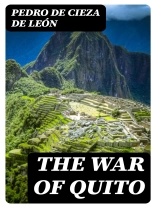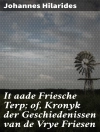In 'The War of Quito, ’ Pedro de Cieza de León presents a vivid historical account that intricately weaves the socio-political dynamics of 16th-century South America. Written in a narrative style that reflects a blend of firsthand observations and engaging storytelling, Cieza de León captures the tumultuous conflict between the Spanish conquistadors and the indigenous leaders of Quito, providing a unique lens through which the impact of colonialism is scrutinized. The book stands out within the broader context of chronicling the Spanish conquests, as it balances the perspectives of both the conquerors and the conquered, revealing the complexities of war and cultural exchange. Cieza de León, a chronicler and explorer himself, was deeply influenced by his experiences in the New World. His role as an observer allowed him to document not only the wars but also the rich traditions and lives of the indigenous peoples, which may have fueled his desire to present a balanced narrative amidst the backdrop of colonial brutality. His work serves as a critical resource for understanding the cultural and historical milieu of the Andes during the age of exploration. This book is highly recommended for readers interested in colonial history, ethnography, and the nuanced interactions between different cultures. Cieza de León’s engaging prose and meticulous research provide invaluable insights for historians, students, and anyone fascinated by the complexities of power, identity, and resistance in the historical context of the Americas.
O autorze
Pedro de Cieza de León (1520–1554) was a Spanish conquistador and chronicler whose work offers a significant historical account of the early Spanish colonization of South America. Born in Llerena, Spain, Cieza de León traveled to the New World at the age of thirteen. His experiences as a soldier and natural observer equipped him to document the cultures and geographies he encountered. His literary corpus provides invaluable insights into the civilizations of pre-Columbian America, most notably his 'Crónica del Perú, ’ which offers an unparalleled glimpse into the Andean world prior to and during the Spanish conquest. Among the parts of this work, 'The War of Quito’ stands as a fundamental text. It recounts the Spanish campaign led by Sebastián de Belalcázar against the Inca ruler Rumiñahui and the subsequent struggle for the city of Quito. Cieza de León’s detailed narration of this conflict serves as a testament to his commitment to recording the events of his time. His careful attention to the geography, customs, and politics of the indigenous peoples distinguishes his work from other colonial chroniclers. It is this meticulous scholarship that has made Cieza de León an enduring figure in the historiography of the Americas, often regarded as the 'Prince of the Chroniclers’ for his significant contributions to the understanding of Andean history.












